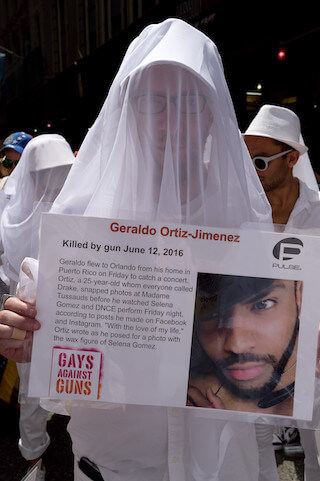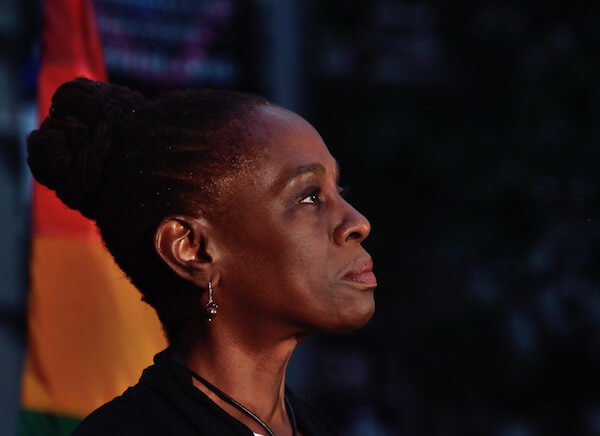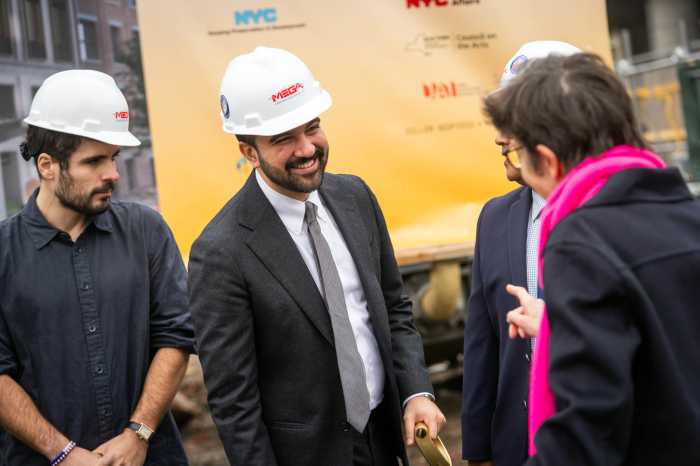Rania Salem Manganaro and Matthew Greer in “Hit the Wall” at the Barrow Street Theatre through July 7. | MATTHEW MURPHY
The Stonewall riots have been the stuff of legend since the aggrieved patrons –– gays, lesbians, transgender, and some in drag –– fought back against cops during a routine raid on a sweltering night in June of 1969.
That act of defiance, where LGBT folk charged “out of the closets and into the streets” of Greenwich Village, is universally accepted as the flashpoint for the LGBT rights movement (they called it gay liberation back then). In part due to scant media attention — the TV stations didn’t bother covering the revolt — a vacuum was created and the mythology keeps growing.
“Hit the Wall,” the rambunctious, somewhat problematic new play by Ike Holter, hopes to help fill that void, generously blending fact with fancy as it attempts to dramatize the events on the fateful first night of the riots.
When the cop (Matthew Greer) declares, “The reports of what happened next are not exactly clear,” the ensemble repeatedly counters, “I was there.”
A scrappy, spirited account of when the walls started tumbling down
At its best, the play effectively depicts the uprising as no organized action by a cohesive gay community. Or caused solely by a bunch of angry drag queens. Rather, we see the rebels as a heady, disparate mix of particularly marginalized, down-and-out queer New Yorkers divided by race, sex, gender identity, and social status. Many were rebellious teens (the drinking age was 18) and it’s doubtful that an older clientele would have been brazen enough to defy the cops.
The characters are fictional albeit familiar types. Early on, we meet Tano (a fierce Arturo Soria), a “spic” from 110th Street, and Mika (an equally sassy Gregory Haney), a black kid who must take two trains, a bus, and a bike to get to the Village. The boys hang out on a stoop adjacent to Christopher Park and the Stonewall Inn, a seedy haven where gays could drink and dance. They throw shade and catty insults at anyone within earshot — and affectionately at each other.
“We’re just here, we’re just bitching, we’re just single, dig it or dig out,” says Mika, tauntingly.
There’s also Roberta (Carolyn Michelle Smith), a women’s rights activist who calls herself a dyke instead of a lesbian, declaring, “We gotta start standing up for ourselves, taking the words they throw at us and owning them.” She has her sights set on Peg (Rania Salem Manganaro, delivering an affecting turn), a lost girl frozen out of her family for wearing boys’ clothes. Her snooty sister Madeline (Jessica Dickey), repulsed by the homosexuals, wants them out of her neighborhood. Madeline begs her sister to act like a normal girl.
Gregory Haney and Arturo Soria. | MATTHEW MURPHY
Cliff (Ben Diskant) is a weed-smoking, draft-dodging vagabond apparently escaping the small-mindedness of his Midwestern hometown. The fresh-faced Newbie (Nick Bailey) has ventured to the Village to find some action and gets plenty more than he expected.
There’s even a waspy stud tossed into this simmering stew. The boys call him the A-Gay (Sean Allan Krill, by turns charming and chilling), a blond, model-handsome Harvard grad who lives in a brownstone on Charles Street and picks up guys like he’s closing a business deal.
Perhaps the most fully realized character of the bunch is Carson (a terrifically soulful Nathan Lee Graham), a determined, transgender black woman dressed like her idol, Judy Garland, who died tragically a few days earlier. Somewhat dubious legend has it that Judy’s death fueled the flames of the rebellion and “Hit the Wall” happily subscribes to this theory. No doubt the prevailing civil rights, anti-war, counterculture, cops-are-pigs ethos in the 1960s played its part as well.
The piece also reminds us that the dive bar was frequently raided. Joints catering to homos were denied a liquor license, so the Mafia ran them illegally, exploited the customers, and paid off local cops. Dressing in opposite-gender clothes was a one-way ticket to the slammer.
The creative team deserves kudos for bringing this momentous event to life, showing how these motley misfits banded together, galvanized by a common cause. Originating at the Steppenwolf Theatre in Chicago, the play is now in New York where it belongs, just a beer bottle’s throw from the site of the riots.
The Barrow Street Theatre, with its intimate, 360-degree stage area, immerses the audience in the action. At one point, the Newbie sat so close to me I could read the scribbles in his notebook. The set, by Lauren Helpern, features a nice replica of the Stonewall Inn façade.
And yet, even with decent performances from a committed ensemble, “Hit the Wall” feels like a collection of sketches instead of a fully formed play. There’s no solid through-line or central character, and the only real dramatic tension is in waiting for the inevitable clash.
Under the direction of Eric Hoff, the raid scene is rousing if not historically accurate, enhanced by well-timed sound and lighting effects. It successfully evokes the violent, senseless persecution of innocent gays. Naturally, bloodied nightsticks and tear gas are involved.
Unfortunately, the patchy production cannot sustain the momentum, failing to fully convey the magnitude of the riots. What’s more, while the dialogue, peppered with snappy period lingo, adds flavor, it can trip up the drama. And the live band is awkwardly integrated into the proceedings.
If you visit Christopher Park today you’ll find George Segal’s white lacquered bronze statues of two same-sex pairs of figures in the act of casually touching. The work, titled “Gay Liberation,” was commissioned as a memorial to the uprising.
Despite its shortcomings, “Hit the Wall” is a valiant homage to that watershed moment, recalling an era when anti-sodomy laws were enforced, homosexuality was deemed a mental illness, and simply touching in public could be grounds for a brutal beating or arrest. The consequence? As Cliff so poignantly puts it, “Your life’s fucked forever.”
HIT THE WALL | Barrow Street Theatre | 27 Barrow St. at Seventh Ave. | Through Jul. 7; Tue.-Sun. at 7:30 p.m.; Sat.-Sun. at 2:30 p.m. | $35-$75 at smarttix.com or 212-868-4444





































